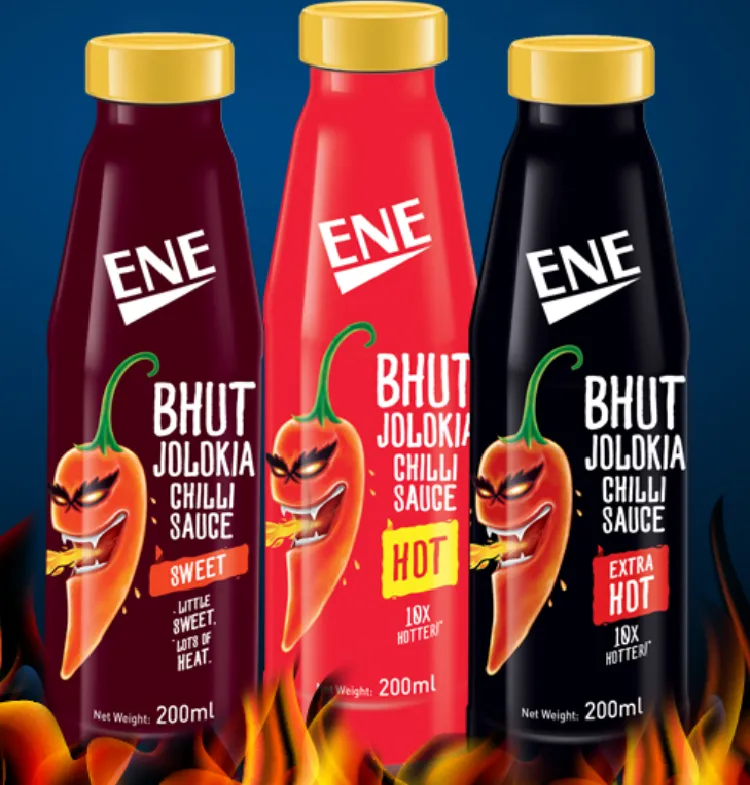Starting with Bhut Jolokia sauce, food startup ENE is creating a market for products from the Northeast
East by Northeast wants to promote the cuisine and indigenous fruits and vegetables of Northeast India. Its first product is a range of sauces using the Bhut Jolokia chilli.
At a glance
Startup: East By Northeast
Founders: Manjusha Barua
Year it was founded: 2016
Where is it based: New Delhi
The problem it solves: Manufactures food products originating from Northeast India
Sector: Processed food
Funding raised: Bootstrapped
How is it that there is no nationally popular food brand from the Northeast, despite the region having an abundance of fruits and vegetables? The absence of a larger market would mean that all traditional produce will slowly disappear over time as farmers will move to cash crops — these were the thoughts that prompted Manjusha Barua to retire from her job at Indian Oil after 20 years, to start something of her own.
ENE, or East By Northeast, makes food products that originate from the Northeast of India. The mission of ENE is to promote cuisine of the Northeast by sourcing local and organic ingredients from partners and supporting communities, as well as use their expertise and knowledge of the region to create products with the unique raw materials.
Daughter of a civil servant father in Assam, Manjusha spent part of her childhood in the state, and had the unique opportunity to travel across other Northeastern states and witness the diversity of this region in every aspect.
While working on her startup, Manjusha met Rinka Banerjee who had just left Unilever after 16 years to pursue her dream to start her own consulting firm, Thinking Forks. At Unilever, Rinka had served as the Director for Food in South Asia. Manjusha roped in Rinka who, after doing extensive research on the availability of raw materials in Northeast, came up with Bhut Jolokia Chilli sauces in three different variants — sweet, hot, and extra hot. The bootstrapped startup has a team of six people spread across Guwahati, Mumbai, and Delhi.
Since the launch in 2016, ENE products are available across 250 outlets in Indian cities as well as on their website and e-commerce websites. The sauces are priced in the range Rs 195 - Rs 200 for a 200 gm bottle.

Bhut Jolokia, also known as Ghost Pepper outside India, is the hottest chilli in India and Asia. Till 2007, it was the hottest chilli in the world. “Had it been anywhere else in the world, the news would have prompted brands to take it in, benefiting the local community. But in India, it went into obscurity,” says Manjusha on her decision to start with this unique chilli. “Though not the hottest anymore, it is perhaps one of the most unique chillies in the world. It has a fruity flavour and its effect on the taste buds is slightly delayed, allowing you to enjoy the food and also relish the tingling feeling of the chilli for a longer period.”
ENE gets fresh Bhut Jolokia puree from Assam and Nagaland. Its representatives meet farmers there, who have been trained on making the puree. The puree is then transported to a partner factory in Uttarakhand, where the final production and packaging is done. ENE plans to build a manufacturing unit in Assam in the near future.
In the pipeline are pickles, marinades, dressings as well as preserves and jams from the Northeast. Four new products will be launched soon and ENE aims to spread to 25 cities in India.
The dominance of multinationals in the FMCG space, which provide localised versions of their global products, has been challenged by the growth of brands like Patanjali which introduced indigenous products. Creating a market for indigenous food products not only assists the communities that grow them, but also helps in preserving the cultural heritage of a region. In a space largely ruled by MNCs, startups play an important role in redefining the processed food market.







